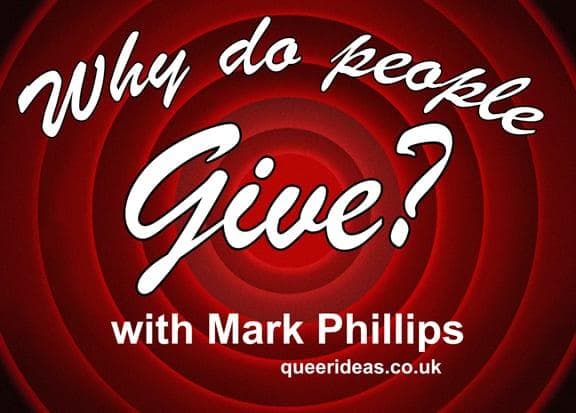Why do people give? Talking to donors during the coronavirus crisis
In this special edition of the Why do people give? podcast by Mark Phillips, Amber Nathan discusses recent, relevant research conducted by Mark’s agency Bluefrog Fundraising. Amber has run Bluefrog’s research function for 16 years and here she offers you her expert analysis of how donors feel about charities during the coronavirus crisis.
- Written by
- Mark Phillips
- Added
- May 28, 2020

Huge thanks to Mark Phillips for letting us reproduce this podcast. You can listen to it on his blog here.
Today, I’m sharing the first feedback on a Bluefrog research study aimed at finding out what UK donors need from charities during the time of the coronavirus crisis. It should be emphasised that these are still early days and we expect donor attitudes to further evolve over the coming weeks.
Back in February, we launched an independent study into attitudes to giving amongst donors to organisations working with people suffering from neurological disorders. In early March, as soon as we started to see the impact that the coronavirus would have on us, we repurposed this study, widening the remit of the people we were speaking to and refocusing on the impact the virus would have on giving to charity.
This has meant that we have been able to gain an understanding of how donors attitudes to giving has been influenced by coronavirus, the lockdown and the subsequent social fallout from job losses and social distancing policies as the impact of the virus has grown over time.
This is a qualitative study. That means that rather than asking a large number of people a series of relatively shallow questions about giving to charity, we have long, in-depth conversations with a much smaller number of charity donors where we can explore in detail how they are feeling at the moment and the role charities have in their life.
Each interview has three main components:
- What have been the main issues when thinking about the pandemic and how has thinking changed over the past few weeks?
- How has the pandemic influenced giving behaviour and how are they thinking about giving now, as compared to before the pandemic?
- What role, if any, has the work of charities had in their lives since the arrival of the of the pandemic?
All interviews were undertaken by Amber Nathan, who has run Bluefrog’s research function for the last 16 years. During that time she has spoken to thousands of donors from throughout the world, so she’s pretty experienced at this type of work.
Amber and I discuss her initial findings in detail in the podcast. In summary, the key findings are:
- Over the last few weeks, we’ve gone from coronavirus being irrelevant to being a key focus of people’s lives. Donors are on their own journey and at any point, they may be confused, in denial or frightened about what might happen.
- Trust is an issue. People, confused by government dishonesty (during the Brexit debate) and negative news stories about charities over the last few years are struggling to know who to trust. They really value authenticity. This is not the time to be changing your brand.
- Younger donors feel invincible, middle-aged donors are taken aback and are concerned about children and parents, older (70+) donors place this crisis into context of previous disasters and emergencies. All see charities as part of the solution and understand that there is an increased need to give.
- People want to take some control over the position we are in. Stocking up on toilet roll is just one example of this. There is a sense of helplessness that leaves many people feeling very uncomfortable.
- For those who are financially secure, life is quite easy. They are at home and secure. Leaving home seems dangerous and they are frustrated/guilty that they can’t do more to be part of a solution.
- They would like to volunteer AND give to relevant causes.
- Relevance means work is predominantly UK based. It is focused on causes such as health, helping the elderly, homeless people and children in poor or dysfunctional households.
- Charities must talk about their work in terms of coronavirus. They must acknowledge what we are all going through, but show how they are mitigating the impact of the virus. This gives the donor a sense of agency.
- Some people are frightened about the impact on their finances. But others are spending much less on themselves and can afford to give much more.
- The sense of wanting to support charities is just starting to grow. People were in denial for a while, now they can see that the work of charities could be essential to help us get through this. They will still support their current charities but will give more to charities or associated organisations (such as the NHS) who are actively working to reduce the impact of coronavirus. We expect to see an upswing in philanthropy in the coming months.
- There is a greater sense of desire for communities to come together to defeat the virus.
- People tend to use the term coronavirus rather than Covid-19.
Five things fundraisers should do
Charities need to make themselves visible – show what you are doing. Donors think charities have been quiet. They want to know what you are doing.
Charities need to ask for help – if they need it. Not a single donor had felt they had been directly asked to support work to tackle coronavirus, though younger donors had seen appeals on social media. Committed donors will not stop supporting organisations that they value, even if there is no direct relevance to coronavirus. Be authentic in all communications.
Charities should give people a chance to show that they are part of the solution – many older people feel they could do more. Giving is a safe and relevant way for them to help. They want to be useful and be seen as useful. Your copy should ensure the donor feels part of a wider group so offer a sense of collective identity.
Charities should, where possible, be relevant – show how you are mitigating the impact of the virus. As an aside, no one had been asked to fund medical research into developing a vaccine, though this would be a very attractive offer.
Charities should plan their communications now – think about what changes the country will go though in the coming weeks and months and adapt your communications to answer donor needs. Show donors what help is required and – most importantly – show donors what THEY are achieving by giving to you. They want to be part of beating coronavirus. You can give them that opportunity.
Next steps
The research will continue as we track how attitudes continue to change. If you are interested in finding out more or understanding how you might change your current fundraising strategy to engage and help your donors at this time, please drop me a line at things@bluefroglondon.com.



















